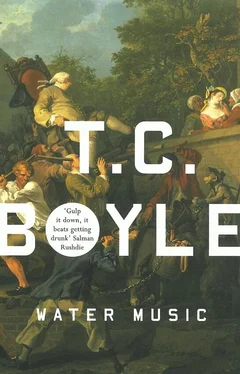He is perishing, winding down the long tunnel of waste and death, hurtling toward completion in the dust of generations gone down. He is perishing, quite simply, of thirst. Of hunger too — but the thirst is more immediate. At night, when they remember, the Moors give him a handful of kouskous and half a cup of yellow swill. Tonight they forget. His stomach contracts on air, cells wither and die like jellyfish washed up on the beach. Then the temperature drops and he lies huddled in his jacket, shivering and sweating, the fever an internal weather valve, on and off, sun and sleet. Outside, beyond the circle of tents, jackals shriek like a knife in the heart and hyenas gather to intimidate the moon. There will be weeping and sorrowing and the gnashing of teeth, he thinks. Then he closes his eyes.
The explorer’s dream is immediate and vivid. He is out on the Great Desert in the heat of midday, the sun a torch, his mouth full of sand. There are men behind him, strangers — burned faces, beards, tattered clothes. They trail out over the horizon like ants. In his hand, a forked stick. At his side, Zander — wally old Zander — Ailie’s brother. They used to fish together. “Where is she when we need her?” asks Mungo. “At home,” says Zander. “Waiting.” A man gags and pitches forward. The explorer turns him over and then starts back: the eye sockets are empty, the gums drawn back from the teeth, the skin crusty as a glazed ham. At that moment a pewter dipper appears overhead, its belly frosted with dew — and then another, and another — a procession of them, dippers full of water, floating overhead like gulls riding an updraft. A feeble huzza goes up from the men. They stretch out their arms and smack their gummy lips — but the dippers hang there, just out of reach. Frantic, they scramble over one another’s shoulders, their fingers raking the sky. The dippers are coy, wriggling and sashaying, flirting with the outstretched fingers: but they won’t give up a drop. The men despair, dashing their heads against stones and shrubs and rocky crags. “Do something!” they implore. “Help us!” Just then the forked stick begins to twitch. Mungo cocks his ear to the wind. He hears something: faint and distant, lilting and lyrical. A wet trickle of sound, like a flute or a harp. Can it be? He is quick, firm, decisive. “Follow me!” he shouts, and begins jogging toward the swelling sound of it, the roar, the hiss, the sweet syncopation of water rushing over a bed of stones. Dazed, the men stagger to their feet and hobble after him. Across a plain, up a rise and there, there it is! The Niger, clear and cold as an October morning, neat lawns clipped along its banks, punts, coots and great silent swans coasting over the dimpled surface, salmon leaping, cool ferns and leafy elms fanning the shore. He plunges in, the men whooping at his heels, ecstatic, redeemed, alive. But when he turns round, they’ve vanished. Waves lap, swans duck their heads: he’s alone with his triumph. But no matter, he’s having such a time, churning up waves, blowing bubbles and gulping, swallowing, sucking up the smooth, tooth-chilling current till he can drink no more.
He wakes with a stone in his throat. His tongue is dry. His palate is dry. His uvula. What he needs is a drink. Water. Ice. Blood. A cup of tea. Glass of milk. Mug of beer. He tiptoes to the entranceway and peers out. The three guards are asleep, chewing at their beards and snoring like drunken lords. But here’s the rub: they’re stretched out across the entrance, shoulder to shoulder, the near man flush with the flap of the tent. He’d have to broad-jump the three of them to get clear — and even assuming he could make it, there’s still the thump of his descent to contend with. Why they’d be up like starved wolves at even the hint of a sound, cursing and clutching at their daggers. He hesitates.
But then, miracle of miracles, the man in the center rolls over, exposing a few inches of open ground. It’s now or never. The explorer eases out of his boots, takes a deep breath, and steps over the first man. The air is still. Somewhere a bird cries out. But the guard sleeps on, stertorous, lips smacking and lids twitching. Mungo shifts his weight to the front foot and begins to swing the left leg over when suddenly he feels a bit woozy, his mind for some reason flashing on the high-wire artist at Bartholomew Fair. It was years ago. The young explorer stood in the crowd, Kewpie doll under his arm, and watched the man negotiate a wire strung two hundred feet from the ground. The man was in the process of balancing a barge pole in one hand and juggling half a dozen apples in the other, when a pigeon landed at the tip of the pole. The man fell.
Mungo blinks his eyes and finds himself seated on the chest of the first guard. The guard mutters something in Arabic, slow as syrup, and then begins rubbing the explorer’s hand against his bristling cheek. The sensation, considering the circumstances, is not at all unpleasant. ‘‘ Yummah ,’’ groans the guard, as passionately as a lover, ‘‘Yibhah!’’ But then he drops the explorer’s hand and segues into the stertor of sleep while Mungo steals off into the night.
♦ ♦ ♦
For more than a month now the explorer has been a captive of the Moors. He is held in solitary confinement. His horse and goods have been appropriated. He has not been charged with any crime. The question of snubbing out his eyes has, praise to Allah, been shelved for the time being. It seems that Fatima, Ali’s principal wife, has sent word from Deena that she insists on examining the freak intact — evil eye and all. (In London they flock to see the human caterpillar and the man with three noses; in Ludamar it’s albino mutants.) Still, the explorer’s life has been anything but idyllic. He’s been held against his will, harassed as an infidel, threatened with death and mutilation, starved, bullied, tormented, bored, deprived of conversation, intellectual stimulus and water. And he hasn’t laid eyes on his interpreter for a week. When he last saw him, Johnson was still keeping a tongue — civil or otherwise — in his head. Ali had found that flap of muscle and fatty tissue a sine qua non when interrogating the explorer about the arcana of his dress and baggage: the shoes and stockings, the buttons of his coat and trousers, his compass, watch and razor. “How does this work? And this?” Ali inquired, directing his questions to Johnson while his sullen dark eyes fixed on the explorer’s face. Eventually, he made the explorer step in and out of his clothes thirty-seven times so that successive groups of rubberneckers could marvel at the ingenuity of it. After the thirty-seventh demonstration, Ali expressed a curiosity as to why Mungo had come to the Sahel in the first place: if he wasn’t a trader he must be a spy. “I’m looking for the River Niger,” Mungo told him. Ali studied his great toe for a moment and then looked up. “There are no rivers in your country?”
♦ ♦ ♦
Down a gentle rise from the encampment — no more than three hundred yards — are the wells. Mungo can hear the lowing of the cattle as they crowd round the troughs for their nightly irrigation. When he gets closer he can make out the rounded humps and the wild spiked horns jabbing at the sky like a forest in motion. The cows — more like overweight gazelles than beef on the hoof — stamp and push and bellow for water. He could bellow along with them. He could cry and screech and out-howl all the demons in hell he’s so thirsty. But what’s this? Something moving in the stand of acacias up ahead. The explorer sidles up for a closer look.
Six or seven slaves, muffled in their burnooses, are lounging around an open fire, passing a pipe and laughing. Every once in a while one of them dips a bucket in the well and sloshes its contents into a trough, where the cattle snort and shove to get at it. Mungo steps out of the shadows and goes down on his knees to them. “Water,” he begs. “Give me water.” And then in English: “A drop, a taste, a spoonful!”
Читать дальше












